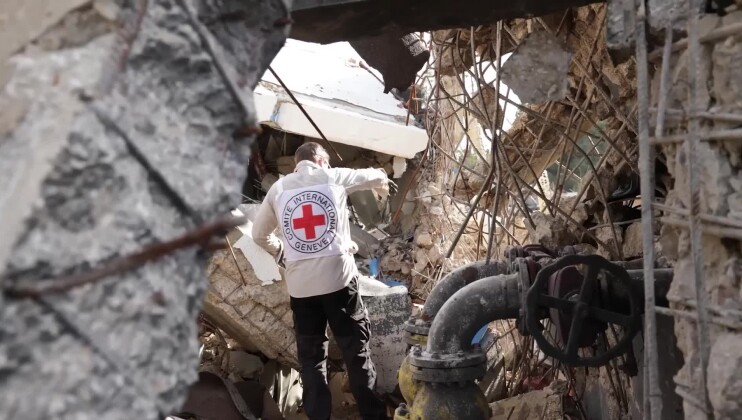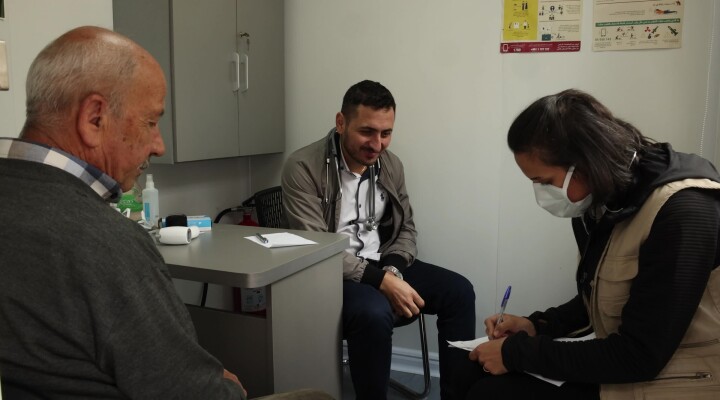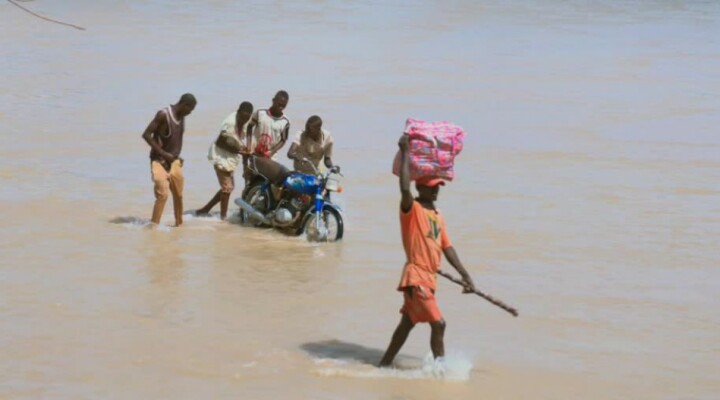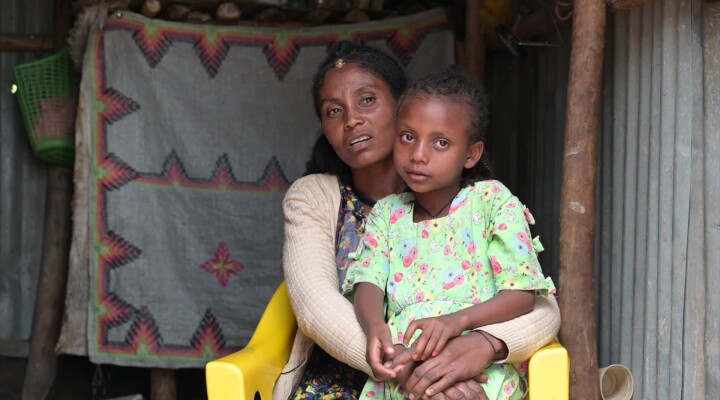South Sudan: Displaced by conflict, struggling with hunger
Over two million people in South Sudan have fled their homes because of conflict. Many, like Nyathon Pur, have come to Kolapach, a small village in Jonglei State in the northern part of the country. Most fled with little more than the clothes they were wearing. Everyone here is hungry.
“I came last year when the fighting broke out in Malakal. We were displaced,” Nyathon explains. “We are in the bush, staying under this tree, we don’t have a house. We don’t have anything.”
Nyathon came to Kolapach with her children and grandchildren, and, like thousands of others, they are now dependent on food aid. This year the land in Kolapach won’t grow enough to feed everybody. The next harvest, however much it brings, is still months away. Food supplies are almost exhausted. To try to prevent a ‘hunger gap’ the ICRC has begun food distributions to 24,000 people.
“We found out that the harvest is poor this season,” explains ICRC delegate Meseret Mengistu. “As a result we predict the hunger gap to come earlier and there will be a shortage of food for the displaced people as well as the host community. // “There is no health facility, no safe water for drinking, these are the major challenges for the community.”
But in a region as vast, and sometimes insecure, as this, the food from the ICRC has to be airdropped. It is a difficult and often inefficient way to deliver supplies: aid agencies sometimes call airdrops the measure of last resort. In Kolapach, they are a lifesaver.
Once the food has landed it has to be collected and carried to those who need it. Nyathon, with four daughters and five grandchildren, cooks very carefully. She has to make sure the food lasts as long as possible, and that everyone gets a mouthful.
“My children are still really hungry,” she says, once the day’s one meal is over, “but I am just protecting them. If I cook all the food at once, tomorrow they will have nothing to eat.”
But Nyathon is very resilient: to supplement the family’s diet, she tries to work as well, collecting wood, and selling it in the local market. She knows better than anyone the dangers of food shortages.
“When you don’t have food, you go to the bush and cut the trees, carry them on your head, you will be tired, it’s painful,” she explains.// “If you don’t do that your children can die from hunger.”
Food distribution like this will never be a longterm solution. The real aim is to save lives now, so that, when the time comes, these families can return home, strong, healthy, and ready to start their lives again.
“ICRC has a vision for this community,” explains Meseret Mengistu. “For them to settle and for the displaced to return back to their homes and start a sustainable livelihood in the future.”
And that, of course, is a goal shared by everyone, including Nyathon and her family. The food is welcome in Kolapach, but returning home is their chief wish.
“We will stay here for a short time,” she says. “When we’ll see that our home is ok and that things are fine, we’ll go back.”
No one knows how long the insecurity in South Sudan will last, or when things at home will be ‘fine’ again. But at least, in Kolapach, those displaced by conflict are receiving food. That helps them to stay strong, and to keep their plans and hopes for return alive
Shotlist
Location: Kolapach, Jonglei State South Sudan
Length: 5:40
Format: HD H264 mov
Production: Nicola Fell, Yamila Castro
Camera: Joseph Ndungu
ICRC ref: AV389N
Date: December 2015
Copyright: ICRC access all
0:00 – 0:10 Faces at food distribution, pan across
0:10 – 0:19 More faces, specifically Nyathon
0:20 – 0:24 Women sitting with baby in midst
0:25 – 0:28 Close up baby
0:29 – 0:43 Soundbite Nyathon Pur “I came last year when the fighting broke in Malakal. We were displaced. (Internal edit 0:38) We are in the bush, staying under this tree, we don’t have a house, we don’t have anything.”
0:44 – 0:48 Nyathon waiting at food distribution
0:49 – 0:57 Pan round crowds at food distribution
0:57 – 1:01 Close up Nyathon’s hand with ICRC food distribution card
1:02 – 1:05 Wide shot poor harvest
1:05 – 1:11 Mid shot pull focus poor harvest
1:12 – 1:17 Crowds and Meseret Mengistu at food distribution
1:18 – 1:43 Soundbite Meseret Mengistu We found out that the harvest is poor this season. As a result we predict the hunger gap to come earlier and there will be a shortage of food for the displaced people as well as the host community. (Internal edit 1:33) There is no health facility, no safe water for drinking, these are the major challenges for the community.”
1:44 – 1:47 Ground controller for airdrop
1:48 – 1:55 ICRC plane dropping food, tilt down as food lands
1:56 – 1:59 Food landing
2:00 – 2:13 ICRC plane dropping food again, food landing
2:14 – 2:25 Red cross worker and Nyathon picking up food
2:25 – 2:33 women walking with ICRC food bags on head
2:34 – 2:40 Women with food bags walk past cattle
2:41 – 2:48 Nyathon preparing food
2:49 – 2:54 Close up putting grain into pot
2:55 – 3:01 Nyathon and family eating
3:02 – 3:05 Close up small child eating
3:06 – 3:11 Midshot family, food bowl is empty
3:12 – 3:25 Soundbite Nyathon Pur “My children are still really hungry, but I am just protecting them. If I cook all the food at once, tomorrow they will have nothing to eat.”3:26 – 3:29 Nyathon walking with wood on her head
3:30 – 3:34 Nyathon with wood at market
3:35 – 3:38 Nyathon;s hands putting out wood
3:39 – 3:42 Wide shot market
3:43 – 3:47 Nyathon with last bunch of wood
3:48 – 4:04 Soundbite Nyathon Pur “When you don’t have food, you go and cut the trees, carry them on your head, you will be tired, it’s painful.//(Internal edit 3:55) If you don’t do that your children can die from hunger.”
4:05 – 4:11 carrying food bags in hot sun
4:11 – 4:15 Red Cross workers carrying food bags
4:15 – 4:19 Wide shot people at food distribution
4:19 – 4:26 Meseret Mengistu counting people waiting for food
4:16 – 4:42 Soundbite ICRC delegate Meseret Mengistu “ICRC has a vision for this community. For them to settle and for the displaced to return back to their home and start a sustainable livelihood in the future.”
4:43 – 4:52 Mid shot pan along lines of people waiting for food
4:52 – 4:56 Close up faces waiting
4:56 – 5:03 Nyathon eating
5:03 – 5:05 Close up boy
5:06 – 5:10 Family circle eating
5:11 – 5:19 Soundbite Nyathon “We will stay here for a short time. When we’ll see that our home is ok and that things are fine, we’ll go back.”
5:20 – 5:26 Woman and boy canoeing across river
5:27 – 5:33 larger group of canoes on river
5:33 – 5:40 Sunset with canoes on river.



